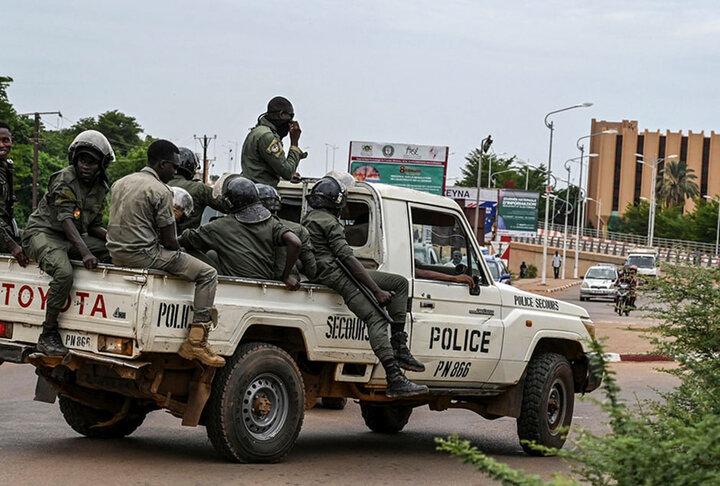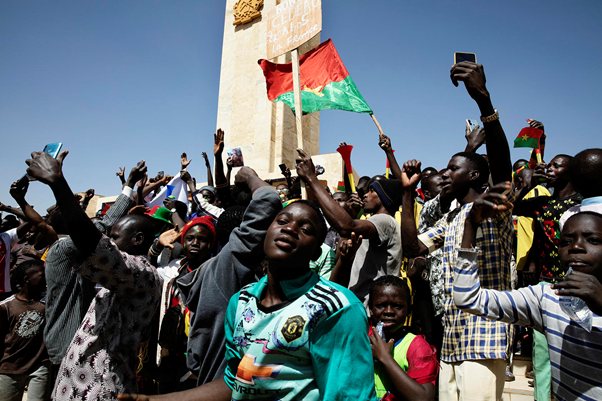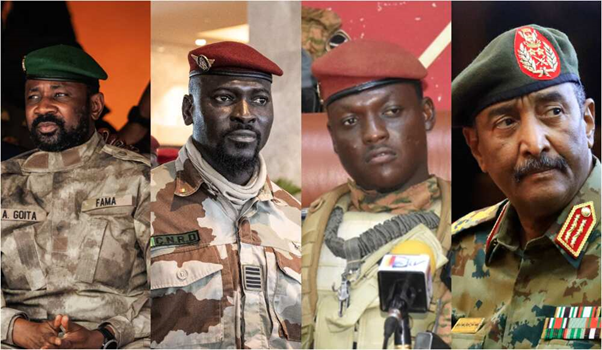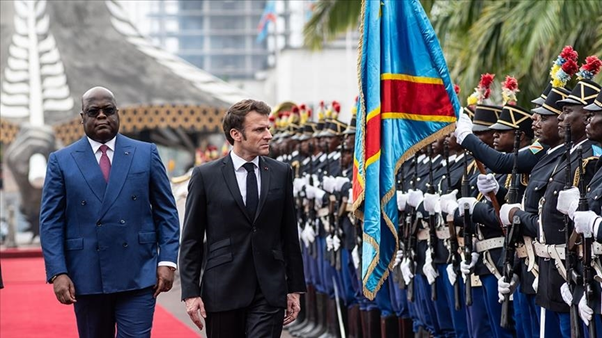coup and insecurity in Africa; The role of French colonialism in the Black Continent

| The coup in African countries such as Niger and Gabon, once again highlighted the historical necessity of reviewing the role of French colonialism in the Black Continent. |
Mehr News Agency, Intergroup International: In 1402, we witnessed a feverish year in the African continent. One of the main political events in several African countries in the last year was the coup. The wave of attempts by the military to take over the coup continued throughout the year, and the last one was the coup attempt in the African country of Chad in March of 1402. Also, the insecurity and widespread protests in Senegal caused the presidential elections in this country to be postponed, and in February, the streets of Senegal witnessed conflict and violence. In addition, Niger, Burkina Faso, Sudan, Somalia, Gabon, Ethiopia, Libya and Mali faced serious insecurity and tension.
From the bitter consequences of the coup in African countries in 1402, it can be pointed out that in addition to violence and human casualties, in the economic and livelihood fields, there are big problems for the societies. Africa has emerged and contrary to the initial claim of the military commanders, there is practically no process called the transfer of power and the military, even after stabilizing the situation, is not ready to prepare the ground for holding elections and hand over power to the political elites. In addition, the emergence of insecurity and instability in the African continent paves the way for the activities of extremist groups.
Confrontation with colonialism
Many American and European media and think tanks try to relate the causes of coups in different countries of the African continent to economic poverty and cultural and social problems. They claim that unemployment and poverty, along with easy access to weapons, have caused African youths to show a desire to participate in military competitions in a possible coup. But without a doubt, such an analysis to describe the causes of coups and insecurity in Africa is not only incomplete and insufficient, but also extremely biased and biased, because from the perspective of the historical role, the Westerners themselves have been very effective in promoting violence and armed activity in Africa. And in order to use the natural resources of the Black Continent, at different times, they have sought to establish puppet governments, and the easiest way to achieve their political, security and economic goals is by encouraging and promoting coups.
Now, Africa is once again rising up against colonialism, and according to Jean Hervé Gezkel, director of the Sahel region of the International Crisis Group, the governments of the Sahel region are following suit. are to take the initiative themselves instead of foreign actors.
Though 13 years have passed since the US and NATO attack on Libya, but in 1402, we saw great insecurity and problems in Libya and several countries on the African coast. Surely, more than anything else, they have been affected by the extravagant policies of the West and have lost their security and stability.
The year 1402 is the year of France’s defeat in Africa
One of the countries with a dark history of colonialism in Africa is France. The coup in African countries such as Niger and Gabon, once again highlighted the historical necessity of reviewing the role of French colonialism in the Black Continent. This European country lost a significant part of its influence and power in the African continent in 1402, and it can be said frankly that French diplomacy in Africa weakened in recent years because many of France’s vassals and former allies distanced themselves from this country. And the interests of the Macron government have faced new challenges after the overthrow of the leaders of Niger, Burkina Faso and Mali.
According to Babakar Andiaye, a senior researcher at the Timbuktu Institute in Senegal, in 1402, France faced a turning point in its relations with Africa, which was the worst situation for the Paris government since It is considered the beginning of colonialism and slavery.
In 1402, we practically saw the collapse of the five-nation alliance, known as G5 Sahel. It means the alliance that France created with 5 African countries Mauritania, Mali, Niger, Burkina Faso and Chad.
Conditions in Africa became worse for France day by day and at the end of 1402, it had to close its embassy in Niamey, the capital of Niger, due to “increasing anti-French sentiments”. . Meanwhile, in the Central African Republic, local forces known as resistance replaced the French soldiers.
In 1402, France faced uncertainty to continue the presence of its military forces in Ivory Coast, Senegal, Gabon, Djibouti and Chad, and its diplomatic and military position lost in the “beach”. What “Charles de Gaulle” and “Jacques Foucault” built after the end of the colonial period no longer exists. Meanwhile, in most African countries, China has become an active economic actor and investor and is the largest investor in Africa. In addition to China, America, England, Turkey and Japan are also working extensively in Africa.
While Russia’s military presence in Africa has strengthened, French troops have left Burkina Faso and Mali, and French President Emmanuel Macron in March 1402 and before the trip Gabon, Angola, the Republic of the Congo and the Democratic Republic of the Congo, announced that France is not going to be a shield against the scourge of Africa, and that he will meet African artists and discuss environmental protection during his trip to the Black Continent. >
African people’s lack of trust in political elites
One of the reasons why some people in African countries support the military is the emergence of incompetent and ineffective political leaders and elites.
Ms. Comfort Arrow, CEO of the International Crisis Group, who previously worked as a special representative of the UN Secretary General in Liberia and is an African diplomat, in December 1402 and Farin Afarz announced: “In recent years, the wave of coups in Africa has increased, and from August 1399 to November 1402, at least seven African leaders have been overthrown by the army.” Military coups often extend in a belt of instability from Niger to Sudan, and there is a possibility of its spread to other regions.
Comfort Arrow also stated the reasons for the support of a significant part of the African people for the coup d’état in 1402: “It seems that the visible support of many African citizens From the coup and the military rule, it has failed because of their lack of trust in the elites, and such a thing cannot be considered as an aversion to democracy. In a situation where the political elites cannot find a solution to the problems of the people, the desperate citizens consider supporting the military government as an alternative”.
Evidence shows that in the coups that took place in Gabon and several other countries, the provocations of extremist groups were effective, but at the same time, local motives and factors also had a significant impact. had. Disappointment with the economic and livelihood conditions and disillusionment with “democracy” in most African countries have provided the social context for the emergence of powerful militaries, and extensive field research conducted in Ghana and several countries on the African coast show that a military coup is attempted. Among the young people, it has many fans and they think that the coup, at least as a catalyst or accelerator, will speed up the process of political developments in the countries and create a situation where ordinary people may also benefit from the gifts and resources. to enjoy the country’s nationality.
Africa and climate change
Analyzing the difficult economic situation of many African countries, only from the perspective of the security factor and the coup, leads to an obvious strategic error because in 1402 once It was proved that natural factors also play an undeniable role in African economic crises. For example, global climate changes, including drought, have had a devastating effect on several African countries and have become the cause of poverty and hunger. Climate changes in East Africa, unprecedented floods in Libya and South Sudan, and deadly storms in South Africa have made the situation difficult for African societies and governments, and unfortunately, the basis for violence has been provided.
In the summer of 1402, the global average inflation was recorded at 7%, but this average in the African continent was higher than 16%, and of course, in some countries, the situation of This was even worse, and inflation in Nigeria and Ethiopia, as the two most populous countries in Africa, reached over 25%.





